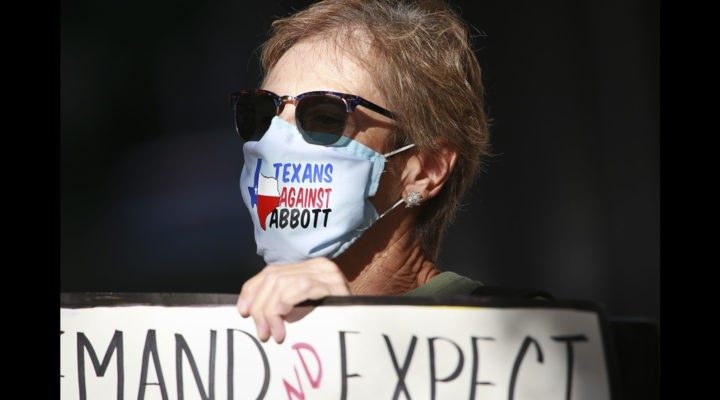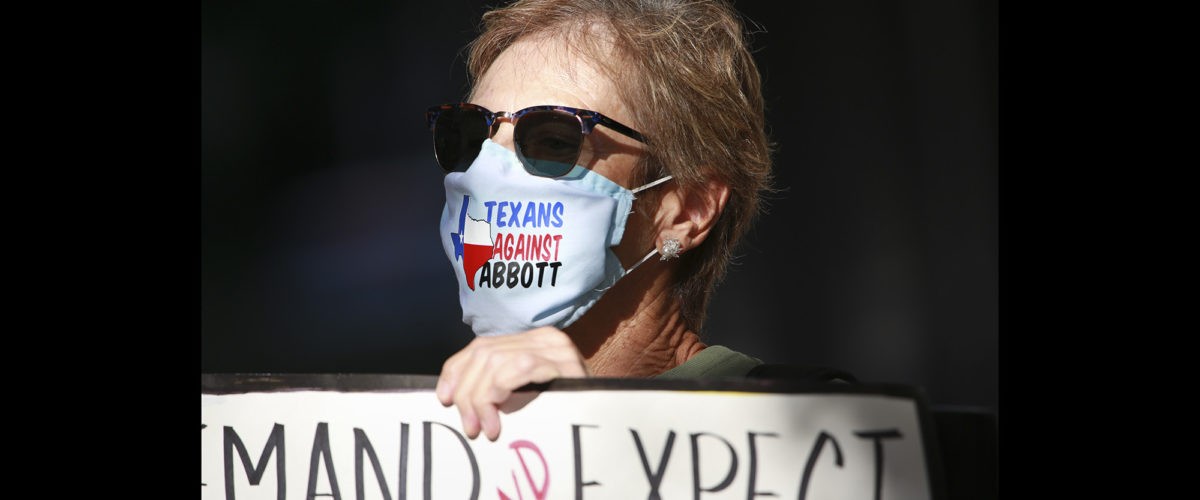Like me, many Christians in Texas live in a state of perpetual agitation over the actions of our governor, Greg Abbott, regarding sensible public health practices around the coronavirus pandemic. His latest action — an executive order “banning any entity in Texas from requiring COVID-19 vaccinations for employees or customers,” according to the Texas Tribune — especially irks me because it gets in the way of my faith practice.
Even though I’m fully vaccinated against COVID-19, and the rates of hospitalization of coronavirus patients is declining in Dallas where I live, I felt compelled to absent myself from the 75th anniversary celebration of my monastic association, The Order of Saint Luke, happening this week. That’s because, at age 68 with chronic health conditions, I’m at high risk of exposure to the Delta variant coronavirus while traveling in an enclosed airplane for more than two hours from Dallas to Pittsburgh, where the retreat is taking place.
CDC guidelines urge avoiding exposure for more than 45 minutes in an enclosed space with little or no ventilation. A pressurized airplane cabin strikes me as a prime example of such a dangerous space, to say nothing of the chance encounters with other people in an airport setting. By banning COVID-19 vaccination mandates, Gov. Abbott directly exposes me and everyone else to coronavirus infections from people who have resisted the public health protection of immunization that has proved to work against COVID-19.
“I feel sure I’m not the only thoughtful Christian whose religious practice has been totally upended by the 18-month-long coronavirus pandemic.”
The Order of Saint Luke, an ecumenical monastic association devoted to liturgical scholarship and sacramental living founded by Methodist leaders in 1946, forms my “discipling community,” that is, the place where my faith is nurtured. When I’m with my OSL siblings at our annual retreat, I can enact my devotion to God in almost-constant prayer in a loving, all-inclusive community. Had I had more assurance of vaccination protection among my fellow travelers, I might have risked exposure for the sake of being with my beloved siblings, a true “fellowship divine.”
I feel sure I’m not the only thoughtful Christian whose religious practice has been totally upended by the 18-month-long coronavirus pandemic. The complexity of my personal decision only underscores how utterly life has changed for everyone amid the worldwide COVID-19 plague. We stand now before truly gruesome numbers so great that we can hardly take them in anymore:
- More than 711,000 Americans dead from COVID-19 as of Oct. 11, according to the Center for Disease Control.
- Some 140,000 children and youths who have lost a parent or grandparent caregiver to coronavirus, according to the National Institutes of Health.
- Upward of 5 million Americans are mourning the loss of a loved one to coronavirus, leaving them vulnerable to prolonged grief disorder, according to Scientific American magazine
- Nearly 90,000 new infections are occurring on average daily in the United States as of Oct. 11, according to the New York Times.
- A new poll from NPR has found that “many Americans have fallen way behind” and that “families are under financial stress and kids are seriously behind in school, among other huge challenges.”
Beyond my own angst, within my denomination hundreds of churches across the United States are struggling with whether to resume in-person gatherings and how to do so safely in keeping with United Methodism’s three basic rules of faith: do no harm, do good, and attend upon the ordinances of God. Having served on the coronavirus task group of my own congregation, I can attest firsthand to the anguish and complexity of making decisions about in-person gatherings.
Just a few considerations with which we’ve struggled:
- How do we protect the congregation’s children under 18 who are ineligible for vaccination?
- How do we enhance our virtual worship experience to fully incorporate online participants into the congregation?
- How do we provide Holy Communion to those who can’t risk coming to an in-person worship service (no, our congregation doesn’t hold with “online communion,” because the Eucharist is meant to be a community act).
I hope this backdrop of living with the pandemic makes my ire with Gov. Abbott’s short-sighted decision more understandable. I’m grateful that I’ll be able to view some of the OSL proceedings this week via Facebook livestream, but it doesn’t fully replace the face-to-face encounter of a spiritual retreat. I’m tired of the politicization of the public health crisis we’re living through, and I regret that any critique of public policies gets automatically cast as a partisan issue instead of an attempt to create common good. I want people to come to their senses, respect the medical science around coronavirus, and join in a community effort to halt this death-dealing plague.
“I’m tired of the politicization of the public health crisis we’re living through, and I regret that any critique of public policies gets automatically cast as a partisan issue instead of an attempt to create common good.”
Until that last desire happens, like many United Methodists and other Christians I know, I cling to my daily prayers for strength, courage and comfort. Only my firm conviction that Jesus Christ is enduring the coronavirus pandemic with us keeps me from collapsing in despair.
Certainly Gov. Abbott and other politicians of his ilk, with their insistence on “personal freedom” over community health, are standing in direct opposition to God’s intention for all people’s well-being.
I’m praying for Gov. Abbott to stop obstructing public health, but in the meantime his edicts aren’t helping. No, not one bit.
Cynthia B. Astle serves as editor of United Methodist Insight, which she founded in 2011.
Related articles:
Conversation growing about COVID vaccine ‘religious exemptions’
COVID-19 and moral incompetence | Opinion by Wendell Griffen
Rapid spread of Delta variant throws some churches into reverse on their newfound ‘normal’


